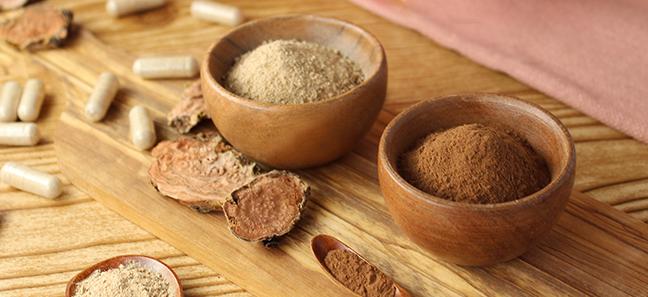
Rhodiola and Ashwagandha: A Power Duo
Rhodiola and Ashwagandha are two adaptogenic herbs that are often taken together due to their many similarities.
Is one of these herbs better than the other? Can you take them together? Do they have synergistic properties?
We’ll answer all of these questions (and more) in this article.
Rhodiola Benefits & Uses:
Rhodiola is a herbal adaptogen that is thought to improve mental concentration and energy.
There are several additional purported Rhodiola benefits, including increased attention, decreased tiredness, and improved memory.
1. Brain Function

In several studies, Rhodiola has been proven to improve learning and memory function.
Rhodiola has been shown in a meta-analysis to enhance learning and memory performance.
According to the researchers, Rhodiola rosea’s mechanism of action on brain function is thought to be a function of its strong antioxidant activity.
2. May Help With Depression
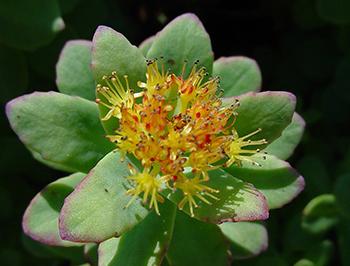
Rhodiola has been shown in studies to have a beneficial effect on depression, which is why it’s becoming increasingly more popular.
A double-blind, placebo-controlled study showed that ~1000mg of Rhodiola Rosea extract daily increased mental well-being in individuals with moderate-to-mild depression.
In the experimental group of this study, overall depression, as well as insomnia and emotional instability, improved significantly after taking Rhodiola, whereas the placebo group did not.
3. Helps With Stress Management
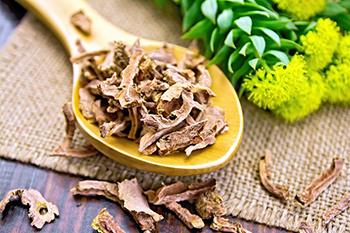
As an adaptogen, Rhodiola is known for its antistress effect on the body.
A clinical trial looked at 118 individuals with symptoms of burnout. After taking 400mg of Rhodiola daily over 12 weeks it was found that they had reduced anxiety as measured by a variety of indexes.
This helps to show that Rhodiola can help with general stress management.
Ashwagandha Benefits & Uses:
Ashwagandha is a well-known Ayurvedic herb with adaptogenic properties.
This plant has been used as an aphrodisiac and tonic in India for millennia. It was also utilized to cure a variety of diseases, including inflammation, psoriasis, bronchitis, asthma, ulcers, and sleeplessness.
Ashwagandha also is said to help with healthy aging.
According to recent studies, ashwagandha may help to relieve anxiety, enhance sleep quality, and promote stress resilience.
1. Stress Management
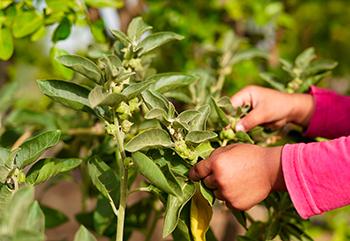
Ashwagandha has been shown to have adaptogenic anti-stress effects, which means it can aid in stress management.
In a study of stressed individuals, researchers discovered that Ashwagandha helped to reduce perceived stress.
This research, as well as other studies, suggests that Ashwagandha may be the ideal herb to counteract the harmful effects of stress on our health.
2. May Help With Anxiety
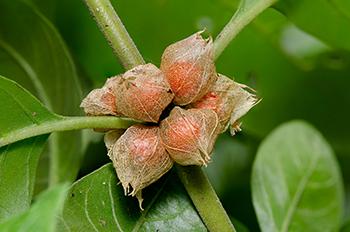
Ashwagandha has been found in clinical studies to aid with anxiety and general mental well-being.
A human clinical trial showed reduced stress levels in individuals that took 300mg of Ashwagandha root extract daily.
Another study showed that ashwagandha extract helps to reduce anxiety.
3. May Help With Insomnia
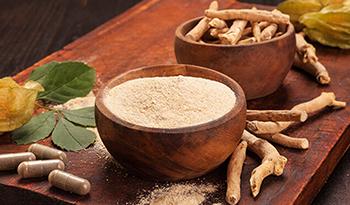
Ashwagandha has been shown in clinical trials to improve sleep quality. In fact, it’s one of the best herbs for sleep.
Researchers investigated the effect of Ashwagandha on sleep and discovered that it significantly improved several sleep measures in individuals with insomnia.
If you need a little extra calm this season, visit the Apothecary today and have a look at the Anxiety & Stress Tincture. It includes a potent blend of stress-relieving herbs—including ashwagandha.
Similarities & Differences
Ashwagandha and Rhodiola both have similar adaptogenic properties. That is, they help your body and mind adapt to stress.
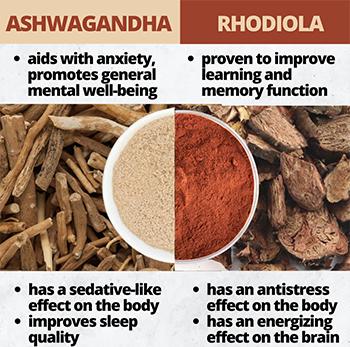 Even though both herbs share similar adaptogenic benefits, they differ in how they interact within the body.
Even though both herbs share similar adaptogenic benefits, they differ in how they interact within the body.
Rhodiola is typically used to increase energy levels and mental performance. It’s a very stimulating herb, which is perfect for those that have lower energy levels and need a boost.
Since Rhodiola has an energizing effect and activates the brain, it is not recommended for those who suffer from insomnia or anxiety.
Ashwagandha is more of a relaxing, calming herb. It works to gently nourish the body and restores the mind.
It has a sedative-like effect on the body that can help to improve sleep quality. It can also help to reduce instances of anxiety.
Which is right for you?
So which herb is right for you, ashwagandha or Rhodiola?
Think of Rhodiola as more of a stimulating, stress-fighting herb. It activates the brain and helps to get you into a focused, productive mode of thinking.
However, be warned that Rhodiola may be too stimulating for some individuals.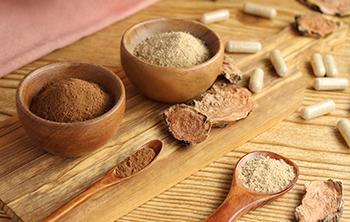
Ashwagandha, on the other hand, doesn’t have the same stimulating effects as Rhodiola.
Ashwagandha has a calming effect on the brain and body. It can help to improve deep sleep and reduce anxiety.
It also has strong anti-stress effects and can help to build your body’s resilience.
Taking Rhodiola and ashwagandha together can have synergistic effects. Rhodiola can help to activate your brain, and ashwagandha can help to provide a calm, focused state. Adding these effects together can help to give your body the energy and focus that you need to knock out a busy task list.
Just make sure to not take this combination around bedtime as it has the potential to interfere with your ability to sleep.
When To Take:
Since Rhodiola is a stimulating herb, it’s best when taken in the morning or early afternoon. It’s best to cut off usage after 3:00 pm as it has the potential to interfere with sleep.
In essence, you can think of Rhodiola as you would a cup of coffee. Great in the morning, not so great at night.
Ashwagandha can be taken at any point during the day. That said, it’s optimal when taken at night as it can help to increase sleep quality.
Aim to take it an hour or so before your desired bedtime.
Potential Side Effects & Interactions:
Rhodiola is generally a very safe herb to use. It should be noted that herbalist David Winston has said that Rhodiola should be avoided by people with bipolar disorder.
As mentioned earlier, Rhodiola can negatively impact sleep due to its stimulating effect.
Ashwagandha root is generally well-tolerated and has a clean safety profile.
According to a safety study, low doses of Ashwagandha (about 300mg daily) do not appear to cause any serious adverse effects or negative consequences.
If you’re looking for an adaptogenic herb to help your body handle stress, Rhodiola and ashwagandha are two of the finest choices.
Your specific needs determine the best herb for you.
Rhodiola is a stimulating adaptogen that can be great for those who feel the need to take life by the horns.
Ashwagandha on the other hand, while still an adaptogenic herb, is more of a calming herb. It’s great for individuals who are already focused and productive but just need that extra anti-stress support.
Note about the author: Daniel has a master’s degree in herbal science from the Maryland University of Integrative Health. He’s the founder of The Botanical Institute, where he writes about adaptogens and other herbs.
You may also like:
 These Herbs Will Relieve Your Anxiety in No-Time
These Herbs Will Relieve Your Anxiety in No-Time
Ancient Japanese Tonic Melts 54 LBS Of Fat (Drink Daily Before 10 am) (Video)

Where can I find Rhadiola and Ashagandha? Do you sell them together? Any store in Philadelphia?
Hi Wanda,
You should be able to find something on Amazon.
Here’s a link:
https://www.amazon.com/s?k=ashwagandha+%2B+rhodiola&crid=IV79OJEU7NXL&sprefix=ashwagandha+%2B+rhodiola%2Caps%2C86&ref=nb_sb_noss_2
There easy to find on eBay in both capsules or powder
Thank you for another’s interesting informations.
Can I take Ashwaghanda or Rhadiola for Overactive hormone??
I take Ashwaghanda well above the 300 mg. Is there any safety study on higher doses for sleep?